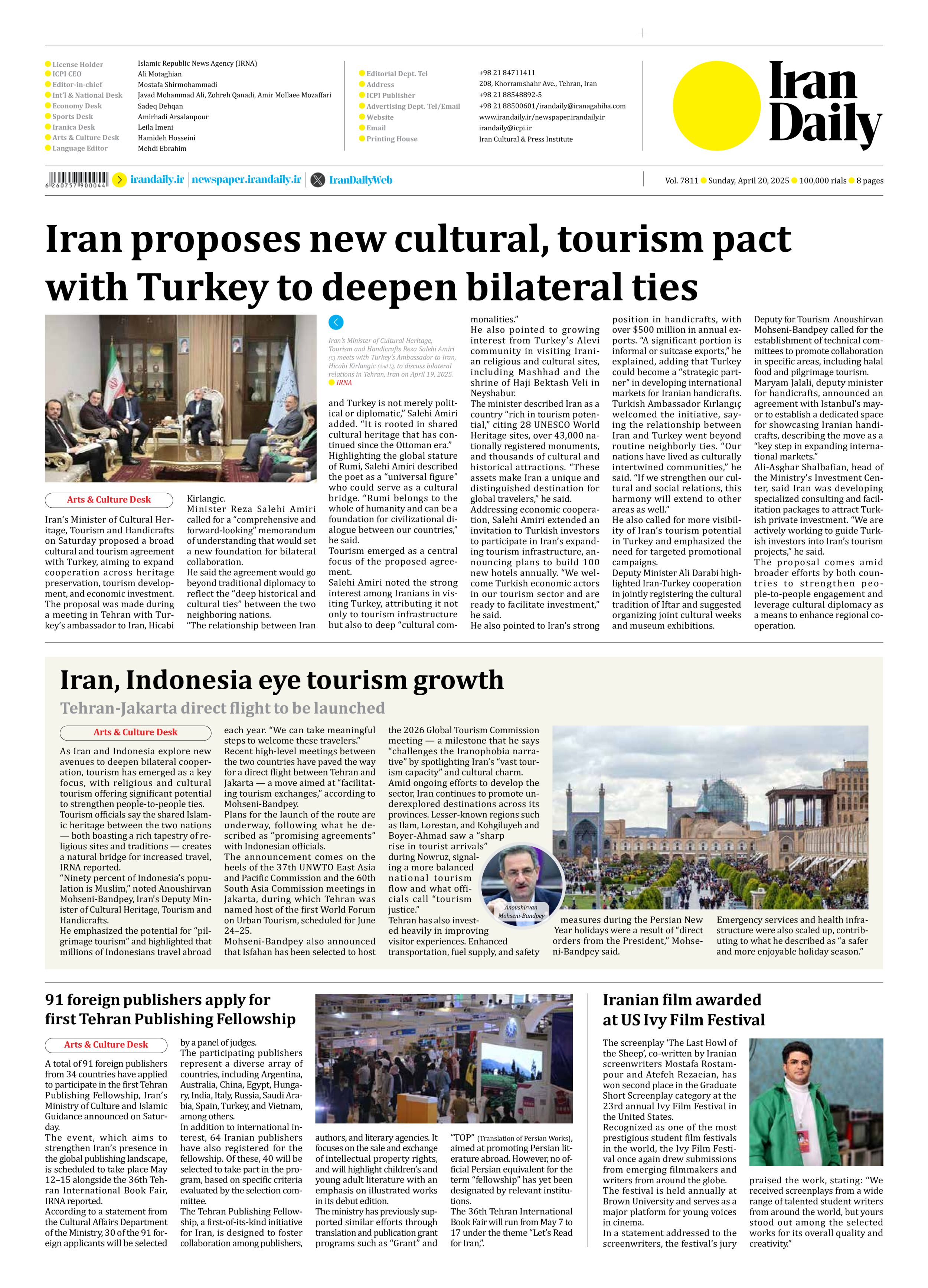
Iran proposes new cultural, tourism pact with Turkey to deepen bilateral ties
Iran’s Minister of Cultural Heritage, Tourism and Handicrafts on Saturday proposed a broad cultural and tourism agreement with Turkey, aiming to expand cooperation across heritage preservation, tourism development, and economic investment.
The proposal was made during a meeting in Tehran with Turkey’s ambassador to Iran, Hicabi Kirlangic.
Minister Reza Salehi Amiri called for a “comprehensive and forward-looking” memorandum of understanding that would set a new foundation for bilateral collaboration.
He said the agreement would go beyond traditional diplomacy to reflect the “deep historical and cultural ties” between the two neighboring nations.
“The relationship between Iran and Turkey is not merely political or diplomatic,” Salehi Amiri added. “It is rooted in shared cultural heritage that has continued since the Ottoman era.”
Highlighting the global stature of Rumi, Salehi Amiri described the poet as a “universal figure” who could serve as a cultural bridge. “Rumi belongs to the whole of humanity and can be a foundation for civilizational dialogue between our countries,” he said.
Tourism emerged as a central focus of the proposed agreement.
Salehi Amiri noted the strong interest among Iranians in visiting Turkey, attributing it not only to tourism infrastructure but also to deep “cultural commonalities.”
He also pointed to growing interest from Turkey’s Alevi community in visiting Iranian religious and cultural sites, including Mashhad and the shrine of Haji Bektash Veli in Neyshabur.
The minister described Iran as a country “rich in tourism potential,” citing 28 UNESCO World Heritage sites, over 43,000 nationally registered monuments, and thousands of cultural and historical attractions. “These assets make Iran a unique and distinguished destination for global travelers,” he said.
Addressing economic cooperation, Salehi Amiri extended an invitation to Turkish investors to participate in Iran’s expanding tourism infrastructure, announcing plans to build 100 new hotels annually. “We welcome Turkish economic actors in our tourism sector and are ready to facilitate investment,” he said.
He also pointed to Iran’s strong position in handicrafts, with over $500 million in annual exports. “A significant portion is informal or suitcase exports,” he explained, adding that Turkey could become a “strategic partner” in developing international markets for Iranian handicrafts.
Turkish Ambassador Kırlangıç welcomed the initiative, saying the relationship between Iran and Turkey went beyond routine neighborly ties. “Our nations have lived as culturally intertwined communities,” he said. “If we strengthen our cultural and social relations, this harmony will extend to other areas as well.”
He also called for more visibility of Iran’s tourism potential in Turkey and emphasized the need for targeted promotional campaigns.
Deputy Minister Ali Darabi highlighted Iran-Turkey cooperation in jointly registering the cultural tradition of Iftar and suggested organizing joint cultural weeks and museum exhibitions.
Deputy for Tourism Anoushirvan Mohseni-Bandpey called for the establishment of technical committees to promote collaboration in specific areas, including halal food and pilgrimage tourism.
Maryam Jalali, deputy minister for handicrafts, announced an agreement with Istanbul’s mayor to establish a dedicated space for showcasing Iranian handicrafts, describing the move as a “key step in expanding international markets.”
Ali-Asghar Shalbafian, head of the Ministry’s Investment Center, said Iran was developing specialized consulting and facilitation packages to attract Turkish private investment. “We are actively working to guide Turkish investors into Iran’s tourism projects,” he said.
The proposal comes amid broader efforts by both countries to strengthen people-to-people engagement and leverage cultural diplomacy as a means to enhance regional cooperation.







